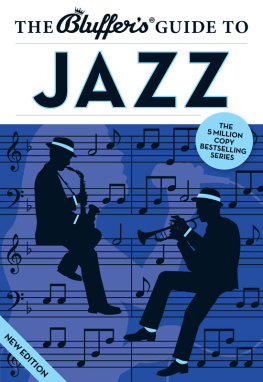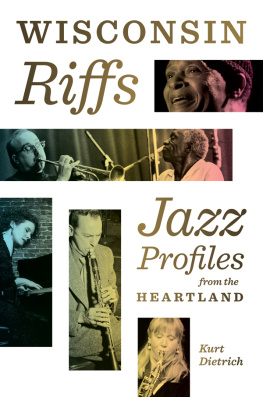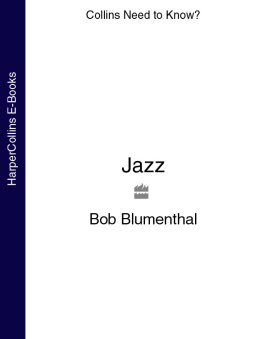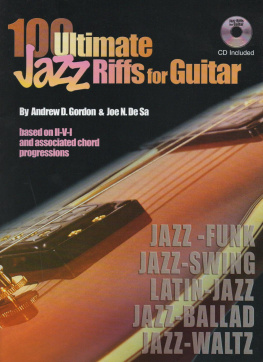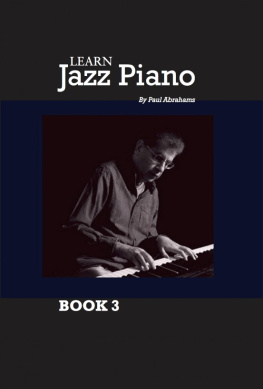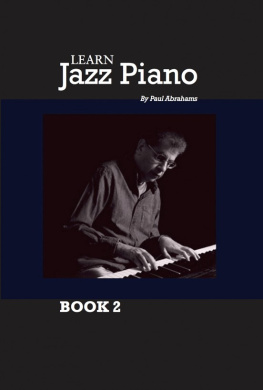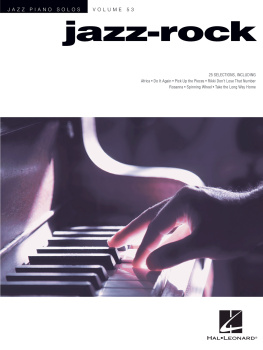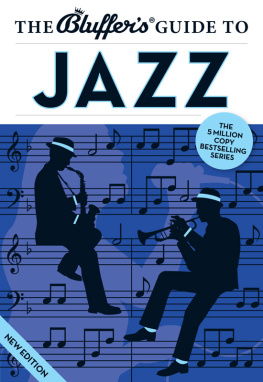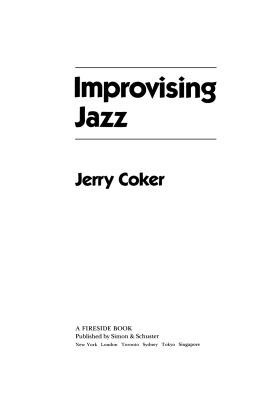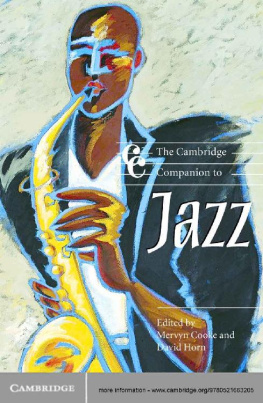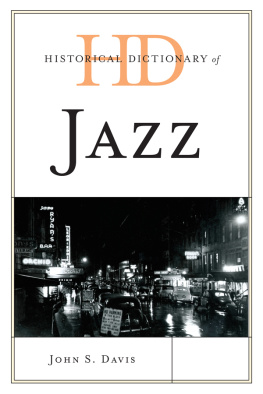

Colette House
52-55 Piccadilly
London W1J 0DX
United Kingdom
Email:
Website: bluffers.com
Twitter:
First published 1987
This edition published 2013
Copyright Bluffers 2013
Publisher: Thomas Drewry
Publishing Director: Brooke McDonald
Series Editor: David Allsop
Design and Illustration: Jim Shannon
With acknowledgements to the late Peter Clayton,
co-author of the original edition.
Additional contributions by John Lewis.
All rights reserved. No part of this publication
may be reproduced, stored in a retrieval system
or transmitted in any form or by any means, electronic,
mechanical, photocopying, recording or otherwise,
without the prior permission of Bluffers.
A CIP Catalogue record for this book
is available from the British Library.
Bluffers Guide, Bluffers and Bluff Your Way
are registered trademarks.
| ISBN: | 978-1-909365-44-5 (print)
978-1-909365-45-2 (ePub) |

If youve always assumed that Ruby Braff was a female wrestler and Randy Brecker is a kind of aphrodisiac muesli, dont be put off.

J azz is a good subject for bluffing because whoever happens to contradict you is almost certainly bluffing as well. This is because no one seems to know for certain how, where or why it all began. So your theories should, in theory, be as good as anyone elses. You may also hold the most outrageous critical opinions (for example, that Bunk Johnson was a fluent and inventive trumpet player, or that Jelly Roll Morton was a model of modesty and self-effacement), and citizens of the jazz world, far from regarding you as a nutter, will declare respect for your viewpoint and earnestly discuss the basis of your contentions.
However, there are three notes of caution. The earnest jazz enthusiast is as earnest as anyone you are ever likely to meet, so:
- Never make jokes about jazz. If you do, make them with a fairly straight face or, at most, a slightly apologetic smile.
- Whatever line you take, stick to it no matter where it might lead you.
- Dont agree with anyone completely. You might generously concur now and then in moderate mutual admiration of the art of Dink Johnson (or whoever is in the frame), but make sure that it is for different reasons. Total agreement will only lead to a reputation for indifference and might even raise suspicion.
One advantage of jazz over other kinds of music is that you dont have to listen to it if you dont want to. And plenty of people who do listen to it dont actually listen either, because they have their own agenda. While the music is being played, live or on record, they are arguing, very loudly, about how or even if the contents of rare and crackling old 78s and battered LPs should be transferred to CD. They are questioning whether this or that presenter/editor/columnist/authority knows what he or she is talking about.
They are pontificating on matters such as exactly when Louis Armstrong stopped being great, why Miles Davis was the way he was, what Anthony Braxtons geometric titles really mean, and why it cant be jazz without a banjo. They are asking whoever is sitting next to them which two Blue Note sleeves were designed by Andy Warhol, and whether David Stone Martins sleeves were often better than the music within them.
This chatter used to die down only during a bass solo when it was suddenly apparent that everything had gone comparatively quiet. But then bass players realised that the subtlety and brilliance of their playing was being masked by the sound of other instruments, so they fought back by purchasing amplifiers of their own and winding up the wick to suit themselves. Any chatter during a drum solo is usually pointless as it is too noisy even to hear your own bickering.
Do feel free to join in all this innocent fun. After all, there is no reason not to, and its one way to advance your own credentials. If youve always assumed that Ruby Braff was a female wrestler and Randy Brecker is a kind of aphrodisiac muesli, dont be put off. Ignorance has never deterred others, and in this kind of verbal skirmishing, he who hesitates is defeated. So, get in there and grab your share of pontification.
This short but definitive guide sets out to conduct you through the main danger zones encountered in jazz discussions, and to equip you with a vocabulary and an evasive technique that will minimise the risk of being rumbled as a bluffer. It will give you a few easy-to-learn hints and techniques designed to allow you to be accepted as a jazz aficionado of rare ability and experience. But it will do more. It will give provide you with the tools to impress legions of marvelling listeners with your knowledge and insight without anyone discovering that before reading it you didnt know the difference between a trumpophone and a mobile phone.

If you feel like suggesting that the word jazz is derived from the African-American word jizz, meaning a certain horizontal exercise, then theres nothing to stop you.

T he glorious thing about jazz is that there is neither a universally accepted definition of the word nor a factually provable account of the musics origins.
You might want to maintain, for instance, that the word jazz is simply a corruption of jars, arising from the fact that an improvised, percussive sort of music was first played by the people of what became The Gambia. They used glass jars, washed ashore in 1756 after a consignment of Frank Coopers Oxford marmalade went down off West Africa, striking them with dried vulture bones. Always be specific about stuff like this; it adds conviction, and such detailed knowledge should deter contradiction. Even if its patent nonsense.
Or if you feel like suggesting that the word jazz is derived from the African-American word jizz, meaning a certain horizontal exercise, then theres nothing to stop you. Unless you happen to be talking to the likes of jazz historians such as Paul Oliver, Alyn Shipton or Scott Yanow, who will likely have embarked on some even more abstruse theory before you can get a word in.
You could point out that more recent research has revealed that, contrary to popular belief, jazz really began in 1846 when a famous Belgian called Adolphe Sax invented the saxophone. For years Sax was the only famous Belgian. He originally had the military and circus band market in mind, but there was a decidedly hepcat (see Glossary) element in his make-up. Contemporary accounts claimed that when he was developing the instrument, blowing experimental licks in his workshop, he sounded like an amalgam of Lester Young, Charlie Parker, Sidney Bechet, Gerry Mulligan, Paul Desmond and, er, others. Sadly, this is mere hearsay not helped by the fact that none of these noted jazz musicians had yet been born.
Ironically, early practitioners of so-called classic jazz repudiated the saxophone, probably because they suspected that in years to come certain critics would make menacing noises about the purity of the music being sullied by its blaringly intrusive sound.
Next page
